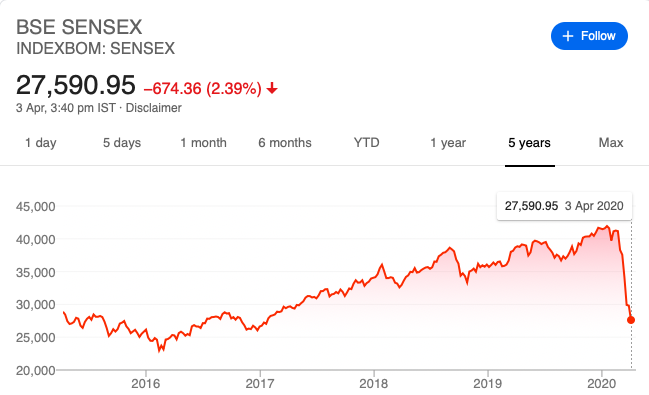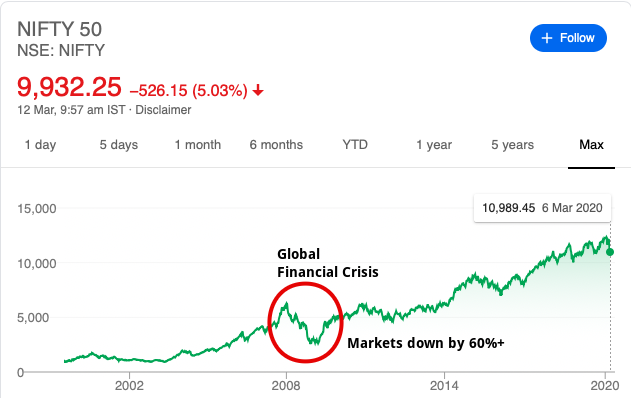The VUCA world is now alive and kicking in its full form – Volatile, Uncertain, Complex and Ambiguous. Throw in some irony too! Imagine, we have the cleanest air in decades and yet we move around wearing masks.
Well, I know that you are concerned about your investments in equity or equity mutual funds. And you have questions. How should you navigate this VUCA phenomenon?
Let’s take up some of them and see if there is a rational way to approach the concerns.
Q: Will the markets fall further?
A: As of today (April 6, 2o2o), Nifty 50 Index is at 8083. This is 32% down from the high of 12,430. The index is pushed back by 5 years to levels seen in 2015.
See the 5 year journey of the other index – BSE Sensex

Now, that by itself is a substantial correction. However, given the nature of crisis we are facing, it is difficult to say if it will further correct substantially or not.
The possibility cannot be ruled out, though. It has corrected much more in the past, such as during 2008-09 period.
Q: Does that mean I should withdraw my investments and wait for the the markets to recover?
A: Frankly, if you are terrified and cannot take any losses further, you may consider doing that. However, you must know that two things will happen.
One, you will have converted paper losses to real.
Two, if the markets recover in a way similar to the fall, your portfolio will miss out on the gains too. It took the beating but it will now fail to participate in the rise.
As an example, since the year 2000, if your portfolio was sitting out the 10 best days, your equity returns would have dropped to half compared to an always invested portfolio.
Miss out 20 best days and your portfolio will get only a quarter of the returns of the always invested portfolio. (Source: MorningStar)
You know what all has happened since the year 2000. The reeling under the dot com bust, the global financial crisis, the Chinese Slowdown and the current COVID19 pandemic.
So, you have to decide if you can live with the lower returns or permanent losses and still meet your financial goals.
Q: That’s fine. But my portfolio is in deep red. Will I ever see it green with positive returns?
A: Here’s an interesting statistic. The Nifty 50 index makes fresh highs every 3 years, on an average. So, if the index is at 8000 today, then in 3 years, it should be breaching the previous high 12,400. Even if it doesn’t do so and only manages to reach the last high, you will have made your money.
Now, I am only hoping that you did not invest all the money that you had to invest at 12,400. In that case, you will not make money. Hopefully, you will recover your investment value.
Here’s some more optimism.

Q: Interesting! So, given the crisis and its impact, what kind of returns should I expect now from my investments?
A: That’s a good question. As a thumb rule, with equities one can expect about a 50% premium (or more) over a risk free rate of return over a 5 year plus period. So, if our risk free rate was 7% a while ago, we can expect about 10.5% to 11% returns.
However, as you are aware, the policy rate and hence the risk free rate has now dropped. With that, you should adjust your return expectation downward.
All in all, you are likely to get a real rate of return (excess over inflation). That’s what matters in wealth building and meeting your financial goals.
There are many nuances to it but this should help you set a reasonable returns expectation.
Q: Should I stop my SIPs for now?
A: Of course not. Now, more than ever you should continue the SIPs and take the benefit of the current mood of Mr Market, which is throwing bargains at you.
Only if you need the money in the next few years, you should stop SIPs and park the money in safe, non volatile investments.
Q: Should I invest aggressively now… may be increase my SIPs?
A: Yes, you may. But you should consult your financial advisor and / or refer your own financial and investment plan. They will guide you better about the course of action.
If this is a rebalancing call, it must be done. If it is more of a tactical (benefit from the crash) call, think, evaluate and discuss, before you take the decision.
Q: As a Unovest Client, does my plan get affected because of these market movements and the impending economic slowdown?
A: If your plan is done at Unovest, you will recall that our assumptions are modest. Returns are not aggressive and our inflation assumption is not the govt published one but what truly affects your personal lifestyle and goals.
In our scenario planning too, we take into account the fact that the portfolio will suffer blows over the investment journey, as much as – 60% at times.
Of course, the real world doesn’t move as per plans but rest assured we have provided for multiple points of failure.
We also don’t allocate money towards equity for any goal requirement due in next 3 to 5 years. We have provided for emergency funds. You are adequately protected with insurance too.
There is one more perspective you will appreciate. The equity markets are down 30% but if your portfolio exposure to equity is only 25%, then the portfolio is likely down only 7.5% to 10% (depending upon the specific investments you have).
Your portfolio is not only equity but fixed income, real estate, alternatives, gold, etc. too.
If things do go south, there is money in other asset classes to ride you through an extended period of market recovery and provide for your living expenses in case of any emergencies.
Q: My investment portfolio seems to be all mangled up. It was built with no particular thought or reason. Should I use the current situation to set it right?
A: That is the best thing you can do right now. In fact (and hopefully), the lockdown gives you time to reassess your priorities and align your investment portfolio to them.
If you are worried about selling loss making investments know that while you sell at a loss, you also get to buy lower/cheaper.
Let your portfolio emerge stronger from the crisis, backed by a plan.
Stay safe!





Yes, Now Days you will increase the investments in mutual funds but keep in mind the fluctuation of Market.